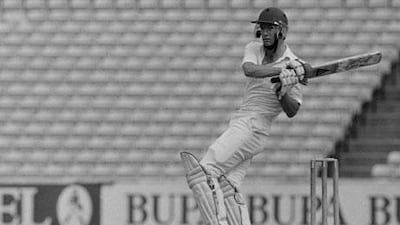The Chennai Test of 2001, where Steve Waugh's ambitions of going past the Final (Indian) Frontier came to a shuddering halt, was only the second that I reported on.
Before it began, at the Indian nets, a group of us stood and watched Sachin Tendulkar hit some balls. He had scored 10 and 10 at Eden Gardens in Kolkata and many wondered how he felt about his contribution to India's most famous triumph being the three wickets he took on that crazy final afternoon.
As I watched the compact stance and the ball speeding straight past the bowler, a clipped English accent behind me said: "He'll score a century here, just wait and see."
When I turned round, I recognised the nose and the piercing eyes, even though they were partly obscured by a straw hat of the type favoured by Vietnamese rice farmers.
On the third day, Tendulkar scored 126 in Chennai as India won the series, and as I rushed downstairs trying to find a telephone line to send my report from, I spied him at one of the phones. The operator was gazing at him in amazement as he stood there with notebook in hand, dictating an entire article to the office in Sydney.
By the time India toured Australia in 2003/04, he had reluctantly embraced the laptop and the internet, though his inability to send mail to anyone other than the office still made him the butt of press box jokes.
Such levity aside though, there was no mistaking the esteem with which Peter Roebuck, who committed suicide on Saturday aged 55, was regarded. More accomplished players than he had made the transition from playing field to newsprint and commentary box - a first-class average of 37 and 33 centuries took him to the threshold of England honours - but few managed it so effortlessly.
He always said it didn't come easy, and that in many ways it reminded him of being a young cricketer again. When he was named one of Wisden's Cricketers of the Year in 1988, the essay mentioned being sent to hospital by an Andy Roberts bouncer while opening the batting for the Combined Universities. He returned, only to see his cap sent flying again.
"He went away, and in a dark room, playing a Joni Mitchell record, he realised that if he wanted to play first-class cricket, he had a lot to learn. He reckoned he had the talent, reflexes and ability to do it, so methodically he worked out what to do and how to do it."
Unlike some former professionals, he was never afraid to rattle cages. Some thought him contrary. He thought it his duty.
Even when the Australian teams that he followed for most of his career in journalism were sweeping all before them, he never failed to introspect.
"The primary duty of journalism is to put your own house in order," he once said. The determination to do that was most evident in the aftermath of the controversy that overshadowed the New Year Test of 2008 between Australia and India.
"In the past few days, the Australian captain [Ricky Ponting] has presided over a performance that dragged the game into the pits," he wrote. "He turned a group of professional cricketers into a pack of wild dogs." Seldom has one article generated such heated national debate.
Trenchant criticism was one thing, but he was also capable of great sensitivity. In the foreword to David Frith's By His Own Hand - A Study of Cricket Suicides, he wrote: "Cricketers are vulnerable because the game attracts sensitive men of aesthetic temperament, the very men who are, in the end, least well served by it."
It wasn't a theory that Frith himself agreed with, though he did end Silence of the Heart, an expanded version of the same theme with these words: "Cricket has this dreadful, hidden burden. It must now answer the very serious question of whether it gradually transforms unwary cricket-loving boys into brooding, insecure and ultimately self-destructive men."
Most of all though, Roebuck was a wonderful source of encouragement to aspiring journalists and cricketers everywhere - a social misfit and an eccentric who paid for hundreds of youngsters to study while walking around in clothes that had seen better days 10 years earlier.
He could also capture the perfect phrase like few others. Watching the West Indies in the nets at Eden Gardens was to be reminded of his description of Shivnarine Chanderpaul. "At once he is inimitable and timeless, no more a product of his period than a kitchen clock, and yet not a creature of the past either for he has scored runs yesterday and today and will score runs tomorrow," he wrote.
"Just that he goes about it in his own sweet and deceptively frail way, relying on deflections and glides, hands as opposed to forearms, a wand as opposed to a tree trunk, persuasion and perseverance as opposed to power. He is a rubber man put amongst concrete pillars.
"In short he is a reminder that, even now, cricket has many faces and talent can take many forms."
In the epilogue to Sometimes I Forgot to Laugh, the autobiography that he wrote in 2004, he mentioned a character assessment written by his father.
"He is an unconventional loner, with an independent outlook on life, an irreverent sense of humour and sometimes a withering tongue … He has a sharp mind and would have made a fine barrister. Instead he chose cricket and fought for his place in a world that didn't suit him nearly as well."
Those that are part of that world won't easily forget him.
Follow
The National Sport
on
& Dileep Premachandran on

